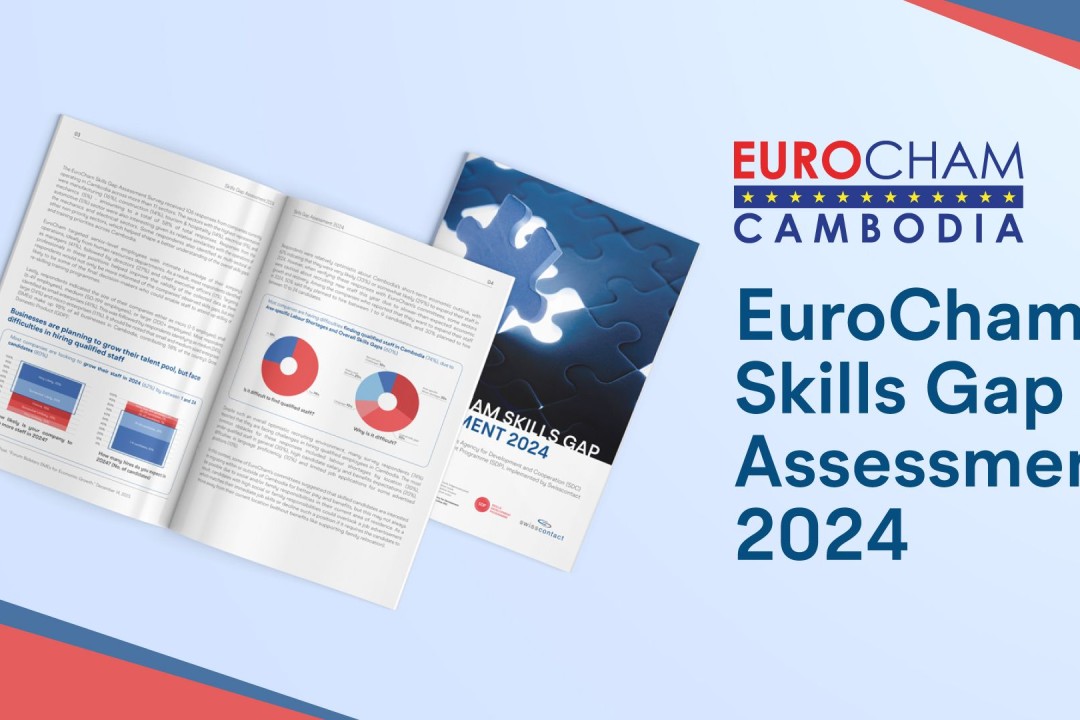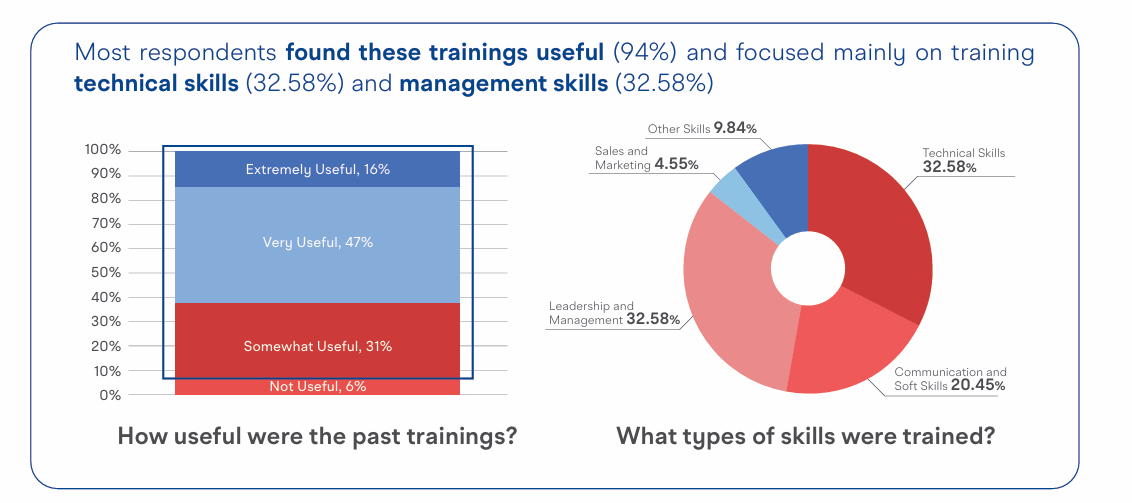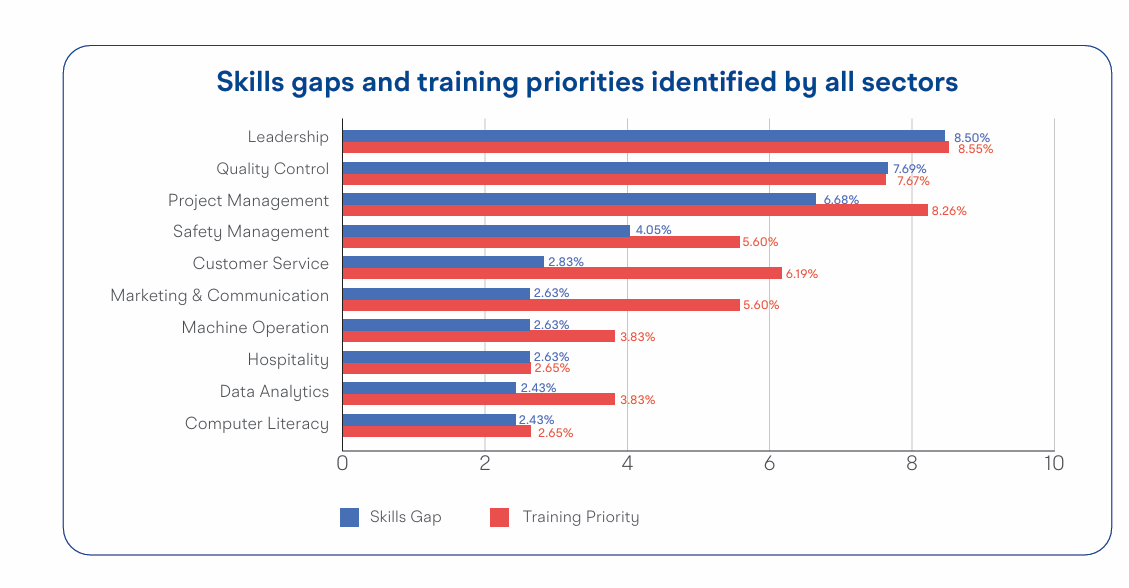Key Findings From The Cambodia Skills Gap Study 2024

A new skills gap assessment survey from the European Chamber of Commerce (EuroCham) in Cambodia, the Swiss Agency for Development and Cooperation (SDC) and Swisscontact revealed that 62 per cent of companies in Cambodia plan to grow their staff in 2024, yet 74 per cent face challenges in finding qualified employees.
Conducted from February to April 2024 in a collaboration between EuroCham and the SDC’s ‘Skills Development Program (SDP)’ implemented by Swisscontact, the survey received 106 responses from companies currently operating in Cambodia across more than 11 sectors.
Preliminary findings from the survey were previously shared at EuroCham’s flagship HR Forum held in April 2024, where B2B Cambodia had a chance to interview EuroCham’s Zandre Van Straten about the survey.
Key Findings From EuroCham’s Cambodia Skills Gap Report 2024
The following five sectors had the highest representation (58 per cent of total responses) in the survey:
- Manufacturing (16 per cent)
- Construction (14 per cent)
- Tourism & hospitality (14 per cent)
- Electrical (9 per cent)
- Mechanics (5 per cent)
For the study’s sample, senior-level employees with intimate knowledge of their companies, especially human resource departments, were specifically targeted, including managers, directors, and Chief Executive Officers (CEOs).
Businesses Plan To Grow Talent Pool, But Face Difficulties Hiring Qualified Staff
Respondents expressed relative optimism about Cambodia's short-term economic outlook, with 62 per cent indicating that they were very likely (33 per cent) or somewhat likely (29 per cent) to expand their staff in 2024. Slower-than-expected economic growth and recovery, however, made them still cautious about recruiting new staff.
Among companies who reported wanting to expand their staff in 2024, 50 per cent said they planned to hire between 1 to 9 candidates, and 30 per cent planned to hire between 10 to 24 candidates.
Despite such an overall optimistic recruiting environment, many survey respondents (74 percent) reported facing challenges in hiring qualified employees in Cambodia.
The most common obstacles faced by respondents included:
- Labour shortages by location (30 per cent)
- Under-qualified staff in general (30 per cent)
- High candidate salary and benefits expectations (20 per cent)
- Difficulties in language proficiency (10 per cent)
- Limited job applications for some advertised positions (10 per cent)
Lack Of Knowledge On Existing Training Programs
Nearly half (49 per cent) of respondents said they were not aware of existing training options in Cambodia, with respondents from the manufacturing and tourism & hospitality sectors being the least aware of existing training options among all sectors. However, among those companies that had made use of training in the past year, 94 percent reported finding the training outcomes valuable.

Only 35 per cent of all respondents confirmed they had sent their employees for training courses over the past year. The data also reveals that while large companies were less aware of training opportunities overall, they were more likely to have participated in training compared to medium-sized enterprises. On the other hand, micro and small-sized enterprises had a high awareness of training programs, but were less likely to take part.
Additionally:
- Respondents who said training courses were useful for their employees covered technical skills (32.58 per cent), management skills (32.58 per cent), and communications & soft skills (20.45 per cent).
- Companies reported that staff participating in social skills training helped improve cross-cultural communication between local and international employees in the workplace.
Soft And Cognitive Skills In Highest Demand In Cambodia
Nine out of the top 10 skills gap across all sectors include a significant component of soft skills, highlighting the importance of interpersonal and cognitive abilities in the workplace. While hard skills may be crucial for securing a specific position (for example, learning machine operation and maintenance for a construction or manufacturing job), most respondents agree that soft skills are equally as critical for enhancing workplace efficiency.
The study further added that when discussing these findings with EuroCham's committees, some urged the Cambodian-based stakeholders to better align their priorities with those of other emerging markets in Southeast Asia focusing on digital and cognitive skills so that the market can become more appealing for international investors interested in the region.
Leadership (8.50 per cent) and quality control (7.69 per cent) were the most prominent skills gap and training priorities cited by all respondents. Analysing the data by each sector individually, leadership, project management and quality control emerged as the most in-demand skills.

Willingness Of Cambodian Companies To Increase Salaries Based On Staff Development
According to the survey, 44 per cent of large companies stated a willingness to increase employees' monthly salaries by up to US $50 after participating in a training, while 28 percent of large companies said they would be willing to increase monthly salaries by more than US $100 after their staff complete training.
The responses of micro, small, and medium enterprises (MSMEs) were grouped together on salary increases revealing that 36 per cent of MSMEs would be willing to increase their employees' monthly salaries by up to USD 50 after training, while 34 percent said they did not plan to make any salary changes at all
Skills Gap Study 2024 Conclusions And Recommendations In Cambodia
The findings reveal the need for both technical and soft skills training, with leadership, quality control, and project management being top priorities. The study also underscores the importance of targeted training programs and strategic collaborations to enhance Cambodia's workforce and attract international investment.
To summarise, the study states:
- There is a demand for collaboration with academia, and other research or training institutes to develop training programs that private companies can use and replicate within their organisations.
- Results show an even split between those willing and unwilling to send employees to training, possibly due in part to the current economic climate, which has led to significant cuts in training expenditure.
- The skills gap can be partly addressed through the prioritisation of closing the urban/rural divide in skills amongst the Cambodian labour force. The Cambodian government has also allocated a budget through the Skills Development Fund (SDF) under the Ministry of Economy and Finance (MEF) for this purpose.
- The findings show that leadership and other soft skills are in high demand along with industry expertise in specific sectors.
- Soft skills are identified as the most transferable and applicable throughout a person’s career, supporting lifelong learning and employment.